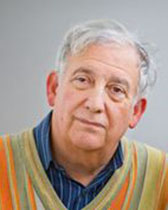Gary Alan Fine
James E. Johnson Professor of Sociology

- g-fine@northwestern.edu
- (847) 491-3495
- 1810 Chicago Avenue, Room 221
- Office Hours: by appointment only
- Make an appointment by email
Area(s) of Interest
Cultural Sociology
Biography
Gary Alan Fine is the James E. Johnson Professor of Sociology at Northwestern University. He received his Ph.D. in Social Psychology from Harvard University. Previously he taught at the University of Georgia and the University of Minnesota. During his long career, he has been affiliated with the University of Cambridge, Oxford University, Australian National University, Sciences Po, Hebrew University of Jerusalem, University of Iceland, and the University of Bremen. He has received a Guggenheim Fellowship, and has been a Fellow at the Bellagio Center of the Rockefeller Foundation, the Center for Advanced Study in the Behavioral Sciences, the Institute for Advanced Study, the Russell Sage Foundation, the Swedish Collegium for Advanced Study, and the Institute for Advanced Studies in Culture. Several of his twenty books have received disciplinary awards in sociology and in folklore.
Fine's research has four distinct streams. He is interested in understanding controversial reputations and problematic collective memories of figures such as Joseph McCarthy, Warren Harding, George Wallace, and Benedict Arnold. This research was published in Difficult Reputations: Collective Memories of the Evil, Inept, and Controversial. His current research involves shifting reputations and political positions of Southern segregationist politics and the examination of ruptures in political alliances. As an ethnographer he has recently published a book (Fair Share: Senior Activists, Tiny Publics, and the Culture of Resistance), an examination of senior citizen progressive activists and the way in which history and experience shapes social movements. His current ethnographic project is an examination of Civil War history enthusiast, and the way that American citizens engage with their past. His third stream of research involves the interpretation of rumor and contemporary legend, particularly political and economic rumor. Fine is the co-author of The Global Grapevine: Why Rumors of Terrorism, Immigration and Trade Matter. Finally, he writes on microsociological theory, focusing on small group culture, and has recently published The Hinge: Civil Society, Group Cultures and the Power of Commitment addressing the role of small groups in the public sphere.
Courses Taught
SOCIOL 101: Freshman Seminar: Scandal and Reputations Syllabus
SOCIOL 403: Field Methods of Social Research Syllabus
SOCIOL 476: Special Topics: Collective Memory Syllabus
SOCIOL 476: Special Topics: Microsociology Syllabus
Books
Symbols, Selves, and Social Reality
(with Kent L. Sandstrom, Kathryn J. Lively, Daniel D. Martin)
Oxford Univeristy Press, 2013
Tiny Publics: A Theory of Group Culture and Action
New York: Russell Sage Foundation, 2012
Sticky Reputations: The Politics of Collective Memory in Midcentury America
Routledge, 2012
Authors of the Storm: Meteorology and the Culture of Prediction
Chicago Press, 2010
Everyday Genius: Self-Taught
Chicago Press, 2004
Whispers on the Color Line: Rumor and Race in America
(with Patricia Turner), Chicago Press, 2004
Gifted Tongues: High School Debate and Adolescent Culture
Princeton Press, 2001
Morel Tales: The Culture of Mushrooming
Harvard Press, 1998
Kitchens: The Culture of Restaurant Work
California Press, 1996
Publications
The Politics of Expertise in the "Who Lost China?" Debate
(with Bin Xu), Social Problems, Vol. 58, No. 4 (November 2011), pp. 593-614
The Sociology of the Local: Action and its Publics
Sociological Theory, 2010
DUST: A Study in Sociological Miniaturism
With Tim Hallett; Social Psychology, 2008
The Chaining of Social Problems: Solutions and Unintended Consequences in the Age of Betrayal
Social Problems, 2006
Tiny Publics: Small Groups and Civil Society
With Brooke Harrington; Sciological Theory, 2004
Opening the "Black" Box: Small Groups and Twenty-First-Century Sociology
With Brooke Harrington; Social Psychology, 2000
